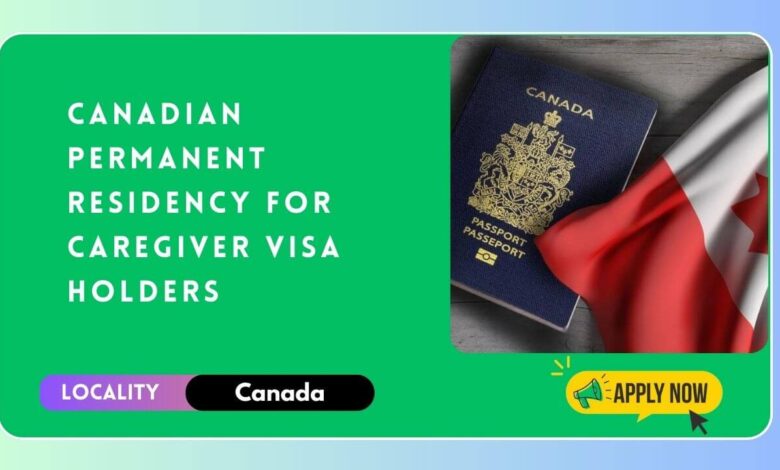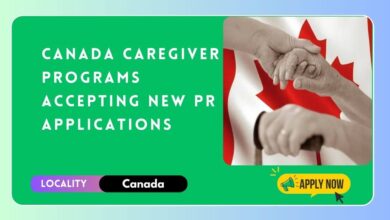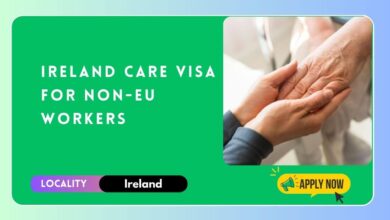Canadian Permanent Residency for Caregiver VISA Holders

The introduction of new pilot programs in Canada is transforming the process of obtaining permanent residency for caregivers. These programs represent a substantial departure from the previous requirements, which required caregivers to acquire work experience in Canada before applying for permanent residency.
Currently, eligible caregivers can obtain permanent resident status upon their arrival in Canada, which simplifies the immigration process and offers increased autonomy and protection against abusive workplaces.
Check Also: How to Migrate to Canada as a Healthcare Worker
Benefits:
- Permanent Residency Status: Canadian permanent residency status provides long-term stability and security by allowing individuals to live, work, and study in any location within Canada indefinitely.
- Family Reunification: Permanent residents have the option to sponsor their immediate family members, such as spouses, common-law partners, dependent children, parents, and grandparents, to join them in Canada. This fosters family unity and cohesion.
- Access to Social Services: Permanent residents are granted access to Canada’s comprehensive social services, which encompass healthcare, education, social welfare programs, and retirement benefits. This ensures that they and their families enjoy a high quality of life.
- Employment Prospects: Permanent residents are granted unrestricted access to the Canadian job market, which enables them to pursue a diverse array of employment opportunities and advance their careers in Canada.
- Pathway to Canadian Citizenship: Permanent residents who have satisfied the residency requirements are eligible to petition for Canadian citizenship, which provides them with a variety of benefits and rights, such as the right to vote and the use of a Canadian passport.
- Education Benefits: Permanent residents are eligible to enroll in Canadian educational institutions and receive government-funded education programs, such as student loans, scholarships, and grants, which can help them achieve their academic and professional objectives.
- Healthcare Coverage: Canada’s public healthcare system is available to permanent residents at a minimal to no cost, ensuring their health and well-being by providing access to essential medical services and remedies.
- Legal Protections: Canadian laws and regulations guarantee permanent residents equitable treatment, equal rights, and legal options in the event of disputes or discrimination.
- Integration Support: Canada provides a variety of integration programs and support services to assist newcomers in adjusting to the country. These services include language instruction, cultural orientation, job search assistance, and community resources.
- Social Integration: Permanent residency status enables individuals to completely engage in civic, cultural, and community activities and contribute to the diverse fabric of Canadian life, thereby facilitating social integration into Canadian society.
- Residency for Life: Permanent residency in Canada is not subject to time constraints and does not necessitate renewal. This allows individuals to reside and work in Canada indefinitely, even if they temporarily relocate abroad.
- Pension Benefits: Permanent residents who satisfy the eligibility requirements may be eligible for Canadian retirement benefits, such as the Old Age Security (OAS) pension and the Canada Pension Plan (CPP), which guarantee financial stability during retirement.
- Global Mobility: Canadian permanent residents are permitted to travel freely within and outside of Canada without the requirement for a visa, which simplifies international travel for business, leisure, and family visits.
- Dual Citizenship: Canada permits dual citizenship, which enables permanent residents to retain their original citizenship and simultaneously become Canadian citizens. This arrangement offers supplementary opportunities for international travel and commerce.
- Cultural Diversity: Canada is renowned for its multiculturalism and diversity, which provide a welcoming and inclusive environment that enables immigrants from all backgrounds to flourish and achieve success.
Caregivers Eligible for Canadian Permanent Residency:
The new pilot programs that Canada has implemented provide caregivers with a simplified procedure for obtaining permanent residency immediately upon their arrival in the country. The objective of this initiative is to address the growing need for caregivers in Canada as a result of the elderly population, while also streamlining and humanizing the immigration process. The following are the benefits of this initiative:
- Permanent Residency Upon Arrival: Caregivers can now obtain permanent resident status upon their arrival in Canada, eliminating the necessity for prior Canadian work experience.
- Simplified Immigration Process: The programs are designed to simplify the bureaucratic process, thereby facilitating the settlement of caregivers in Canada.
- Workplace Abuse Protection: Caregivers will have greater flexibility to exit abusive work environments without compromising their immigration status with permanent residency.
Eligibility:
To be eligible for these new pilot programs, caregivers must satisfy specific qualifications:
- Language Proficiency: A minimum of level 4 in the Canadian Language Benchmarks (CLB).
- Education: A high school diploma or its equivalent.
- Work Experience: Relevant and recent work experience in the caregiving sector.
- Job Offer: A full-time position for home care workers in Canada.
These requirements ensure that caregivers have the necessary tools to provide exceptional care to those in need and integrate smoothly into Canadian society.
Average Caregiver Salaries:
The most recent average salary estimates for caregiver professions in each Canadian province are as follows:
| PROVINCE/TERRITORY IN CANADA | AVERAGE ANNUAL SALARY (CAD) |
|---|---|
| Alberta | $40,000 – $50,000 |
| British Columbia | $42,000 – $55,000 |
| Manitoba | $38,000 – $48,000 |
| New Brunswick | $35,000 – $45,000 |
| Newfoundland and Labrador | $35,000 – $45,000 |
| Northwest Territories | $45,000 – $60,000 |
| Nova Scotia | $35,000 – $45,000 |
| Nunavut | $50,000 – $65,000 |
| Ontario | $40,000 – $52,000 |
| Prince Edward Island | $35,000 – $45,000 |
| Quebec | $38,000 – $50,000 |
| Saskatchewan | $38,000 – $48,000 |
| Yukon | $45,000 – $60,000 |
List of Occupations Under Caregiver Status in Canada:
A variety of occupations are included in the category of caregiver roles, which are dedicated to assisting individuals with their daily living activities. The following are some of the most frequently encountered caregiver roles:
- Personal Support Worker (PSW): Provides personal care and support.
- Home Health Aide (HHA): Offers personal care and light housekeeping.
- Home Support Worker: Assists with personal care and household tasks.
- Live-in Caregiver: Provides around-the-clock care.
- Nanny: Cares for children in their homes.
- Developmental Support Worker: Supports individuals with developmental disabilities.
- Mental Health Worker: Assists individuals with mental health conditions.
- Community Support Worker: Assists individuals with mental health conditions or disabilities in accessing community resources.
- Companion: Provides social support.
- Respite Worker: Temporarily relieves primary caregivers.
- Homemaker: Assists with domestic chores.
Qualifications:
The qualifications necessary for caregiver positions may differ:
- Education: Frequently necessitates a high school diploma or pertinent certification (e.g., a PSW certificate).
- Experience: It is frequently necessary to have prior experience in caregiving.
- First Aid and CPR Certification: Frequently required for the majority of positions.
- Vulnerable Sector Check: Necessary for the work with vulnerable populations.
- Language Proficiency: Ability to communicate effectively in either English or French.
Caregivers Applying for Permanent Residency:
Several steps are involved in the application procedure for Canadian permanent residency through the new caregiver pilot program, as outlined on this page.
- Job Offer: Secure a job offer from a Canadian employer.
- Language Test: Achieve the required CLB level.
- Education Credential Assessment: Validate foreign education credentials.
- Work Permit Application: Apply for a work permit.
- Arrive in Canada and Apply for Permanent Residency Without Work Experience here:
Frequently Asked Questions:
Can I apply for PR as a caregiver in Canada?
You can come to Canada to become a permanent resident or work temporarily as a caregiver.
Can I relocate to Canada to be a caregiver?
Families seeking to hire foreign caregivers must initiate the process by submitting an LMIA application and obtaining approval. After that, the caregiver can then apply for a work permit through Immigration, Refugees, and Citizenship Canada (IRCC). This will allow them to legally work in Canada.
Can a work permit holder apply to be a permanent resident in Canada?
If you have been working in Canada on a valid work permit, you can apply for permanent residence through the “Skilled Workers” stream. This path is open to skilled workers, professionals, and those with a provincial nomination.

